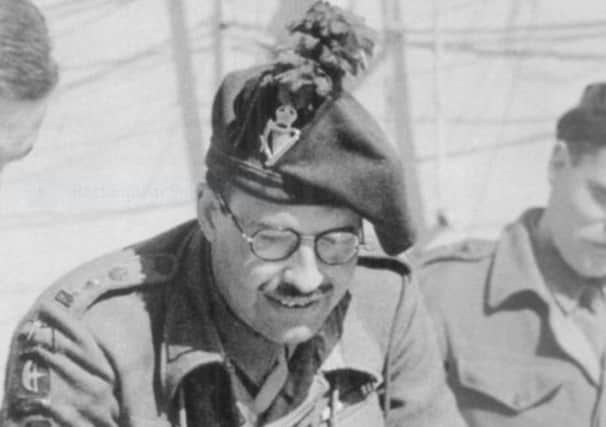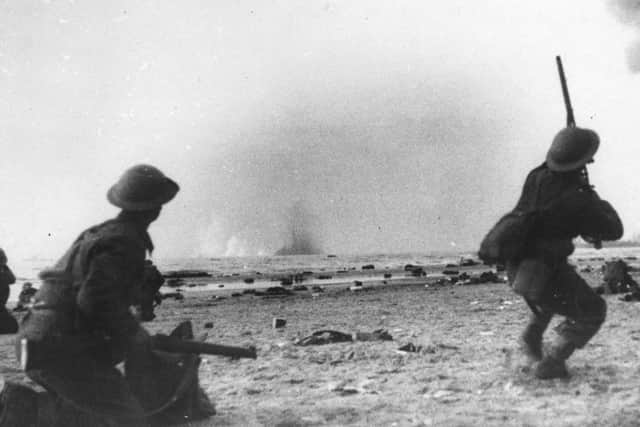Vivid memoirs of Dunkirk written by decorated Royal Ulster Rifles war hero


“Excuse me, are you a steward?” said a man on the deck to a white-coated gentleman who was walking casually past.
“Yes sir,” answered the steward, “Can I do anything for you?” “Would it be possible to produce a glass of beer for me?” asked the passenger, “or if you can’t, a glass of water.”
Advertisement
Hide AdAdvertisement
Hide Ad“Yes sir,” said the steward, “by all means. But you do know the rules sir – I can’t supply you with any alcohol ‘til we’re three miles out.”


“How could we lose the war with people like this around?” the passenger thought to himself.
The passenger was Humphrey Edgar ‘Bala’ Bredin, the Acting Captain of ‘D’ Company, 2nd Battalion, Royal Ulster Rifles, who was leaving Dunkirk with around 50 men from his battalion on an Isle of Man paddle steamer.
The Rifles were a key component in Operation Dynamo, the evacuation of over 338,000 soldiers from Dunkirk between May 26th and June 3rd 1940.
Advertisement
Hide AdAdvertisement
Hide AdThey were amongst the last soldiers to leave, having been part of the rear-guard tasked with “buying time” for the soldiers trapped on the beach, and ‘Bala’ Bredin was to become one of the best known and most experienced officers in the regiment.
A note from the remembranceni.org website has just arrived in Roamer’s mailbox alerting me to a story on the site about the Royal Ulster Rifles at Dunkirk, and how 338,000 Allied troops were saved in a “miracle of deliverance”.
Bala Bredin’s recollections of the evacuation are included in the historic story, along with details of his many other heroic actions as a soldier and officer.
Major-General ‘Bala’ Bredin, who died in 2005 aged 88, was awarded an MC and Bar when serving with the Royal Ulster Rifles in Palestine in 1938 and a DSO in Italy in 1944.
Advertisement
Hide AdAdvertisement
Hide AdHe won a Bar to his DSO in 1945 and received another Bar when commanding the 2nd Battalion, the Parachute Regiment, in Cyprus in 1957 where he was also mentioned twice in dispatches.
The son of a colonel in the Indian Army, Humphrey Edgar Nicholson Bredin was born at Peshawar on the Northwest Frontier on March 28th 1916.
After education at King’s School, Canterbury, he went to Sandhurst and was commissioned into the Royal Ulster Rifles in 1936.
His family boasted a long tradition of military service, with his forefathers fighting on both sides at Agincourt in 1415.
Advertisement
Hide AdAdvertisement
Hide AdHis father and grandfather were both in the Green Howards and two of his uncles served in the Royal Irish Regiment.
While at Sandhurst Bredin was given the nickname ‘Bala’ – the name of a fort in Peshawar and also the name of a winning racehorse owned by the Aga Khan!
His chilling account of the evacuation of Dunkirk, and the vital part played by the Royal Ulster Rifles, makes gripping reading on the remembranceni.org website.
The Rifles had already marched from Louvain (Leuven), 29 miles east of Brussels, to Dunkirk where they held ground and fought around the perimeter of the embarkation area.
Advertisement
Hide AdAdvertisement
Hide AdAt the last minute the Rifles’ order to “fight to the last man” was withdrawn and they had the chance to try to make it to the beaches and hope for evacuation.
They had to await rescue while under heavy fire and bombardment from the Luftwaffe and their ordeal wasn’t over then, as those who were rescued still had to endure the treacherous journey back to England.
Acting Captain ‘Bala’ Bredin and his exhausted comrades from the Royal Ulster Rifles arrived at Dunkirk after their long and arduous march from Louvain during which they were constantly under fire.
“We got our last real position before getting into the crescent around Dunkirk,” ‘Bala’ Bredin recorded in his memoirs.
Advertisement
Hide AdAdvertisement
Hide AdTheir position was in water meadows, with a canal in front of them.
“We were feeling very tired, and in the middle of the night, my second-in-command came round to see that we were alright. I woke up – and it took me about a minute to be able to actually stand up. I staggered around as though I was drunk. And then I was reasonably normal again.”
His memories of being on the beaches are extraordinarily vivid – “Little groups of British soldiers sitting on the sand as though they were at a holiday resort, playing cards while Messerschmitt’s flew up and down. You could see the bullets hitting the sand one after the other down the beach, and these soldiers were saying ‘He can’t shoot very straight!’ when the bullets had missed them by a few yards.”
Acting Captain Bredin and about 50 men from his regiment went to the beach at La Panne where engineers had made a pier by driving army trucks into the sea at low tide putting duck-boarding along the tops of the vehicles.
Advertisement
Hide AdAdvertisement
Hide Ad“So we lined up by this pier and waited for a boat to come along. Nothing happened.”
After an anxious wait they saw “an Isle of Man paddle steamer ...rocking to and fro because of the bombs dropping in the harbour, and we started getting on board. There was a dead man lying across the gangplank, and we stepped over him fairly gingerly”.
Three miles out at sea the steward brought the exhausted officer a glass of beer “and by this time I’d remembered myself,” Captain Bredin noted in his memoirs “and I made sure the soldiers got something as well”.